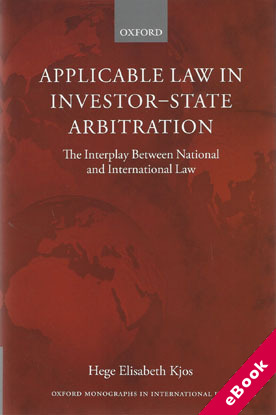
The device(s) you use to access the eBook content must be authorized with an Adobe ID before you download the product otherwise it will fail to register correctly.
For further information see https://www.wildy.com/ebook-formats
Once the order is confirmed an automated e-mail will be sent to you to allow you to download the eBook.
All eBooks are supplied firm sale and cannot be returned. If you believe there is a fault with your eBook then contact us on ebooks@wildy.com and we will help in resolving the issue. This does not affect your statutory rights.
This book examines the law, national and/or international, that arbitral tribunals apply on the merits to settle disputes between foreign investors and host states.
In light of the freedom that the disputing parties and the arbitrators have when designating the applicable law, and because of the hybrid nature of legal relationship between investors and states, there is significant interplay between the national and the international legal order in investor-state arbitration.
The book contains a comprehensive analysis of the relevant jurisprudence, legal instruments, and scholarship surrounding arbitral practice with respect to the application of national law and international law. It investigates the awards in which tribunals referred to consistency between the legal orders, and suggests alternatives to the traditional doctrines of monism and dualism to explain the relationship between the national and the international legal order.
The book also addresses the territorialized or internationalized nature of the tribunals; relevant choice-of-law rules and methodologies; and the scope of the arbitration agreement, including the possibility of host states presenting counterclaims in investment treaty arbitration.
Ultimately, it argues that in investor-state arbitration, national and international law do not only coexist but may be applied simultaneously; they are also interdependent, each complementing and informing the other both indirectly and directly for a larger common good: enforcement of rights and obligations regardless of their national or international origin.